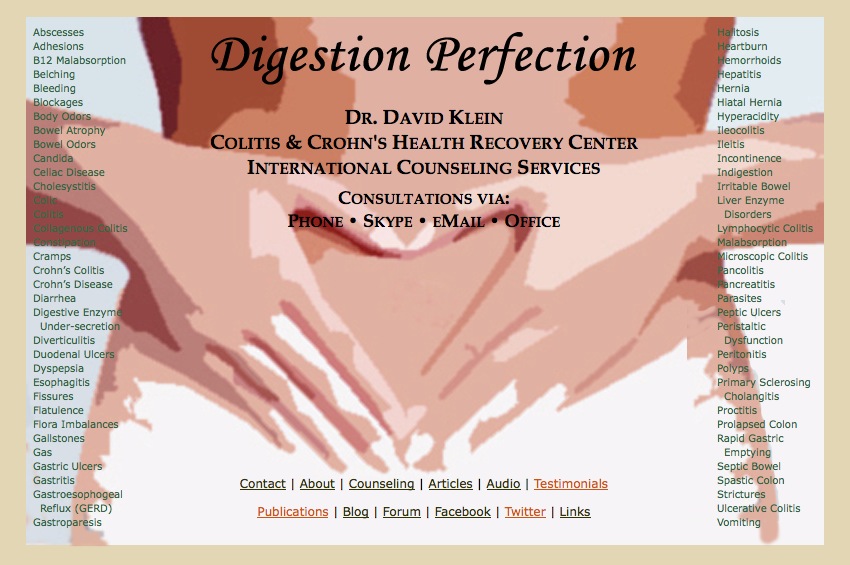
Have you found any foods which exacerbate your symptoms and do you know of any natural remedies?
Crohn's disease is an ongoing disorder that causes inflammation of the digestive tract, also referred to as the gastrointestinal (GI) tract. Crohn's disease can affect any area of the GI tract, from the mouth to the anus, but it most commonly affects the lower part of the small intestine, called the ileum. The swelling extends deep into the lining of the affected organ. The swelling can cause pain and can make the intestines empty frequently, resulting in diarrhea.
What causes Crohn's disease?
Several theories exist about what causes Crohn's disease, but none have been proven….The most popular theory is that the body's immune system reacts abnormally in people with Crohn's disease, mistaking bacteria, foods, and other substances for being foreign. The immune system's response is to attack these “invaders.” During this process, white blood cells accumulate in the lining of the intestines, producing chronic inflammation, which leads to ulcerations and bowel injury.
Scientists do not know if the abnormality in the functioning of the immune system in people with Crohn's disease is a cause, or a result, of the disease. Research shows that the inflammation seen in the GI tract of people with Crohn's disease involves several factors: the genes the patient has inherited, the immune system itself, and the environment. Foreign substances, also referred to as antigens, are found in the environment. One possible cause for inflammation may be the body's reaction to these antigens, or that the antigens themselves are the cause for the inflammation. some scientists think that a protein produced by the immune system, called anti-tumor necrosis factor (TNF), may be a possible cause for the inflammation associated with Crohn's disease.
What are the symptoms?
The most common symptoms of Crohn's disease are abdominal pain, often in the lower right area, and diarrhea. Rectal bleeding, weight loss, arthritis, skin problems, and fever may also occur. Bleeding may be serious and persistent, leading to anemia. Children with Crohn's disease may suffer delayed development and stunted growth. The range and severity of symptoms varies.
Nutrition Supplementation
There are no known foods that cause Crohn's disease. however, when people are suffering a flare in disease, foods such as bulky grains, hot spices, alcohol, and milk products may increase diarrhea and cramping.
What is the treatment for Crohn's disease?
Treatment may include drugs, nutrition supplements, surgery, or a combination of these options. The goals of treatment are to control inflammation, correct nutritional deficiencies, and relieve symptoms like abdominal pain, diarrhea, and rectal bleeding. at this time, treatment can help control the disease by lowering the number of times a person experiences a recurrence, but there is no cure. Treatment for Crohn's disease depends on the location and severity of disease, complications, and the persons response to previous medical treatments when treated for reoccurring symptoms.
Some people have long periods of remission, sometimes years, when they are free of symptoms. however, the disease usually recurs at various times over a persons lifetime. This changing pattern of the disease means one cannot always tell when a treatment has helped. Predicting when a remission may occur or when symptoms will return is not possible.
Someone with Crohn's disease may need medical care for a long time, with regular doctor visits to monitor the condition.
you just have to stomach it
my mum suffers quite badly from Crohn's and has done for as long as I can remember.
Generally, there are no natural remedies, my mum takes a mix of drugs daily but I think steriods are the ones for Crohns.
Starchy foods seem to intensify the pain when a flare up occurs, but just watching what you eat always helps.
My Mom has Crohn's disease & benefitted from reading a book called "Food & the Gut Reaction". She followed it religiously at the beginning when she was first diagnosed & when she has a flare up she goes back to the suggestions found there. when she does have a flare up she goes on a liquid diet which includes a lot of yogurt, dietary supplements such as Boost or Ensure then slowly adds mushy cooked vegetables and apple sauce.
Stay away from any of the cabbage family, including broccoli & cauliflower. Never, never eat corn. Stay away from sugars, fried foods & dried fruit (sugar). Exercise – weird as it sounds is very benefical as it keeps the food moving through your system.
Steroids are not a permanent solution(sorry Bef) as they create more problems in other areas. It took my Mother & my daughter 2 years (daughter has Colitis) to get off prednizone but it can be done through perserverance, diet & other medications.
If you have lost a tremendous amount of weight you can gain it back safely using protein powders in addition to your diet. we had to go that route with my daughter….using a protein powder recommended by a naturopath.
Good luck & all the best…………..
Sorry to hear that you have Crohn's.
As well as the good dietary advice, make sure that you drink plenty of water. Water is underestimated as a cure. It is vitally important for the body…second only to oxygen!
So with both oxygen and PLENTY of fresh water, make sure you avoid stressful situations and start learning to meditate.
Sit or lie down in a relaxed atmosphere perhaps with some soothing music and visualise your body and the cells of your body healing. Move through your intestinal tract healing your cells and making them healthy. Smile. Be happy. Love your body. It's the only one you've got.
Try and meditate every day…even if it's only for a short time. But do it. The power of the mind can do amazing things – together with…..WATER:-))))
Good luck.